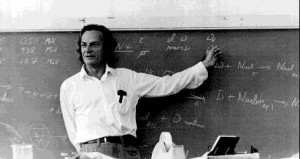I strongly recommend Richard Feynman’s book Surely You Must Be Joking, Mr. Feynman! for anyone interested in the appreciation of the world and the little beautiful things in it. Not able to tell you why I’m thinking about him right now, I found his recollection of his childhood and professional life to be one of the most pleasurable one I’ve ever read. I can say for a fact that his was one of the best books I’ve ever read. And the last time I read this book was more than five years ago. He also wrote The Pleasure of Finding Things Out and What Do You Care What Other People Think.

Written from transcripts of interviews recorded over a long period of time, the man walks through the many curious instances of his precociousness, from learning the secret of mathematics to learning to pick locks and safes. At some point in the later parts of my teenage years, I almost learnt to pick locks too, picking after the physicist. I failed terribly. It was the early days of internet in Nigeria and I desperately craved its promised access to the information highway, and I would do almost anything to get usernames and passwords of uncles and friends without their permission. I failed at that too, eventually, and I remember the very many nairas, savings from my first real (also poorly-paying) job at a computer service centre, which I spent surfing the internet and learning new things along the way. Who knew that a day would come when everyone had internet on their computers for 24 hours every day. As far back in 1997 in Nigeria, that looked like a faraway fantasy of a future.
The book by Feynman also takes us back to the beginning of the research into developing the atomic bomb, and all the mischief he caused on site of the research facilities at Princeton, and as a professor at Carlton and MIT, picking locks and leaving clues for his scandalized superiors. He claimed to be the only person to see the bomb tested with his own eyes through the UV shield of a car. All the other people wore glasses. (He also worked at Los Alamos at some point later). Beside the lucid and very absorbing prose and his story telling abilities, Feynman comes across as an eternally curious being not limited to his field (of Physics) or any field at all in his approach to understanding the world. After the crash of the space shuttle “The Challenger”, he broke down the hard details of a scientific error for the common man on TV at a public hearing, and cemented his reputation forever. Whenever I think about my outlook on the world, I think about how much of it I owe to the kinship with the spirit in Feynman’s book. I also immediately begin to look for the phone numbers of my friends who have always pawned my copy every time I buy a new one.
From the love of the science of language, to syntax, to computer programming (which I learnt at some point during the idle times after my secondary school), to learning to play musical instruments, sing, laugh, ride bicycles, almost crash my parents’ car, mess up my cousin’s hair at some point with the barber’s clipper as an experiment (and getting deservedly pummeled for it later on), and learning to draw, to paint, to write, to learn languages, and mostly to explore the many awesome areas of life as it tosses them my way, I have learn to live life to the full. We have less than 24 hours of it at our disposal every day, but it’s amazing just how much pleasure each discovery brings. If I ever become famous, I want to be like Richard Feynman, a wonderful down-to-earth physicist and a great teacher whose ideas changed the way we looked at the world, but who himself never stopped being just a man, with a regular (although many times very mischievous) taste and sensibilities.
2 Comments to Remembering Feynman so far. (RSS Feeds for comments in this post)